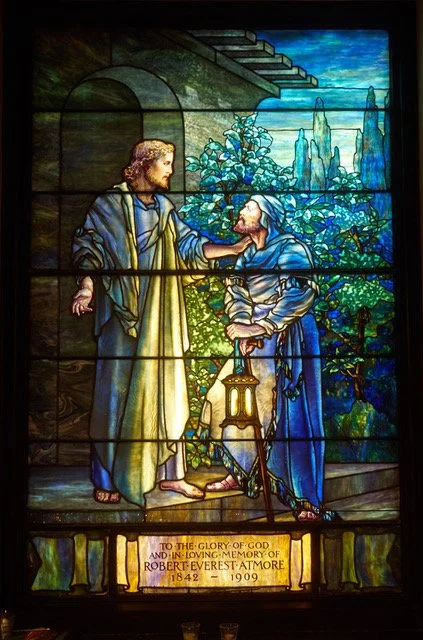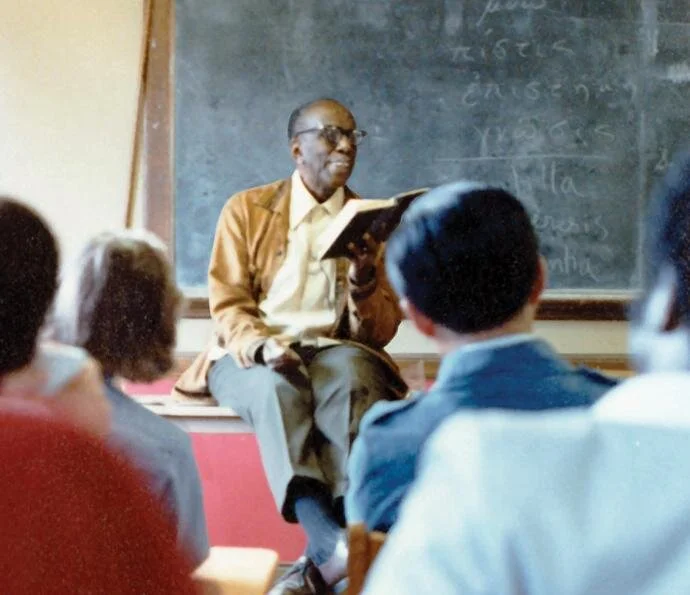Friday Reflection: Eric Liddell I–From Pious Traitor to Wartime Saint
Eric Liddell racing
I’m like most of us, I imagine, who know Eric Liddell (1902-1945), whom the Church honors on February 22, from the 1981 Oscar-winning movie Chariots of Fire. There, Liddell, Scotland’s famed runner, provides compelling counterpoint to an English runner, Harold Abrahams, in their divergent drives, culminating in the 1924 Summer Olympics in Paris. The Jewish Abrahams seeks acceptance by an anti-Semitic British society. Liddell instead seeks to reassure his missionary sister Jenny that his Olympic ambitions do not compromise his commitment, as a missionary, to China. Liddell’s triumph: his stunning Olympic victory and new world record in an unpromising event that replaced his own scheduled for a Sunday. He’d flatly refused to run on the Lord’s Sabbath despite heavy official and media pressure.
The movie softens one reality: the outside world’s scorn and Britain’s condemnation of Liddell as a traitor who upheld a rigid regional piety on a global stage that required transcendent statesmanship.
Until his miraculous win and world record.
The traitor magically morphed into an international hero. But there was more. The flood of memoirs, interviews, YouTubes, biographies, and re-issues of earlier memoirs triggered by the movie’s success further reveal Eric Liddell as the nearest thing to a saint in the lives of many.
That veneration came after the Olympics, through his engagement with his native China from 1925 until his untimely death at 43, from a brain tumor, in a Japanese internment camp in 1945, months before Liberation.
I want to explore here why Eric Liddell (Li Mu Shi [Pastor Liddell] to the Chinese and Uncle Eric to internees) was so revered, even loved then. His story provides a telling glimpse into an especially complex chapter in modern Christianity and in China’s history. His own approach to those complexities suggests ways to help us in many segments of our own world.
This first Reflection of two considers his formative early life, pivotal calling, and almost 20 years as a missionary among the Chinese. The second, to follow next Friday (February 12), focuses on his brief but hugely consequential internment during World War II. There, we witness the same person within a vastly different community (other enemy foreigners in China) in a vastly different circumstance (internment), an experience that, for all its uniqueness, offers much for thought about everyday life and humankind today.
Eric Liddell’s China
Eric Liddell was profoundly shaped by his family and their missionary life in China.
He was born in Tsientsin [today’s Tianjin] in 1902, to a close-knit family with the London Missionary Society (LMS). His Scottish-born father James was an ordained minister of the Congregational Union of Scotland, an Evangelical church that advocated freedom of conscience and autonomy of individual communities, the authority of every member as a priest led by the ordained minister, and baptism and (only occasionally) the Lord’s Supper (Communion) as its sacraments. His mother Mary was a nurse. The Liddells mostly served as rural itinerant missionaries, first in Mongolia, then in Xiaochang (or Siaochang), where the ultimately four children grew up among the Chinese and identified closely with China, like Pearl Buck but unlike the typical missionaries whom she later criticized.
Historically, these were crucial years on several levels. The Liddells participated in the crest and wane of the Protestant missionary movement, thanks to a second Evangelical surge called the Second Great Awakening that sent missionaries into territories opened by British merchants and the military especially in the 19th century. The Liddells went fully aware of the many dangers that awaited them particularly in China.
China had reacted badly to the Western influx. The Liddells arrived during the violently anti-foreign and anti-Christian Boxer Rebellion (1899-1901). As in prior centuries all over the world, missionaries were captured, tortured, and killed in China then and later. China then exploded into civil war, with atrocities, chaos, and physical devastation endangering all lives and worsening the misery throughout the sprawling country.
Eric Liddell’s call
As with other missionary boys with the LMS, Eric was sent at age 7, with his older brother Rob, to the Society’s boarding school in London. He was already deeply devout and engaged in service by helping the hospitalized sick. Was that service part of the mission school’s program?
Years later, he compared his Olympic triumph to his longtime vision to live his Christian faith:
“ . . . since I have been a young lad, I have had my eyes on a different prize. You see, each of us is in a greater race than any I have run in Paris, and this race ends when God gives out the medals” (christianity.org.uk).
Elsewhere, he claimed he always planned to return to his native China. Others argue that those childhood plans meant returning as a missionary like his parents.
In school, however, he had discovered a unique and pivotal gift: an exceptional athletic prowess. By his university years at the University of Edinburgh, Eric’s many international awards as a rugby player and on the track made him famous throughout Britain.
That fame encouraged a friend of his brother Rob, engaged in missions to workingmen and miners, to tentatively approach Eric to speak to this community in 1923. Most were wary of Evangelists but were wild for sports and well knew of the famous Eric Liddell. This friend understood, however, that the exceedingly private Eric kept his faith to himself but he asked anyway. As Eric recounted many times later, while he considered (ever resistant), he remembered a letter from sister Jenny in China that had just arrived with a Scriptural passage that opened a door for him:
“Fear thou not, for I am with thee: be not dismayed: for I am thy God: I will strengthen thee; yea, I will help thee; yea, I will uphold thee with the right hand of my righteousness” (Isaiah 41:10).
As he thought of that passage while pondering the friend’s request, Eric suddenly interpreted it as God’s call to accept this invitation to preach as the threshold to his future in the faith, actively in the ministry.
Using his athletic fame as a lure, he knew, was not a sneaky bait-and-switch tactic. Rather than compromising his faith, sports enriched it and made him a unique Christian male model especially in contemporary Britain. Why?
The Modern Christian Athlete
A Christian paradigm shift had taken place especially in Britain. The British ideal of Muscular Christianity, developed in the mid-19th century, transformed the body from a site of holy suffering to one of virtuous physicality. The model sought to appeal to men, to rebalance the perceived female majority among the devout and the perceived femininity of modern piety (and of Jesus, for some). It celebrated the healthy, active male body as the vehicle for vigorous morality, spirituality, and service to others.
This cultural ideal spread far and wide because of its allied Scriptural and progressive sources. It combined St. Paul’s message in I Cor. 19-20, that marked the body as “the temple of the Holy Spirit” and exhorted readers to “glorify God in your body, and in your spirit,” with Jean-Jacques Rousseau’s prescription, in his didactic novel on child education (Emile, 1762), to develop moral character through physical education. Muscular Christianity also contributed to the turn-of-the-century British cult of the chivalrous, devout Christian knight.
Physical education and competitive sports built the vigorous moral citizen and Christian so it became a key element in educational programs into our time.
All social levels loved athletes and sports. As a devout, recognized athlete, Eric Liddell, was the perfect Evangelist especially for those outside British elite circles. His body and style were far from ideal. He was short for a sprinter (5’8/9) and top heavy: he had a bull neck and barrel chest atop slender legs. His ungainly windmill arm movement, with his head flung back, mouth open, towards the finish, shouldn’t have worked. He was human in his physical flaws and a miracle in his spirit and speed.
In that first talk to working-class men as a 21-year-old college athlete, which was hugely successful, he established a style that perfectly mirrored his demeanor: sincere and simple, often described as if chatting quietly with a neighbor across the fence.
His youth, fame and demonstrated skill as an athlete, and down-to-earth preaching won British youths and working-class adults. So did his approach to people in the same vein: humble, compassionate, and genuine. As private as he was, he offered himself, his own path in the faith and speaking publicly about it, as an example for others. Again as private as he was, he connected easily with strangers. He engaged with a direct, friendly gaze and an expressiveness that often broke his face into dimpled joy, a radiance that witnesses noted throughout his life (see below, from 1942).
He took St. Paul to heart to the point that his athletics, spirituality, and calling became perfect allies. One often-quoted statement to this point (with variations) seems straight from St. Paul: “I believe God made me for a purpose, but he also made me fast and when I run I feel his pleasure.”
Eric Liddell provided a heartening alternative to the critics’ stereotype of the arrogant, even bullying Muscular Christian that we see even today. So did his vision of the world and message to others, contained in his favorite passage from Corinthians that placed Christian charity (KJV; in other versions, love) as the driving life force. The open lines are key:
“Though I speak with the tongues of men and of angels, and have not charity, I am become as sounding brass or a tinkling cymbal.
And though I have the gift of prophecy, and understand all mysteries, and all knowledge; and though I have all faith, so that I could remove mountains, and have not charity, I am nothing.
And though I bestow all my goods to feed the poor, and though give over my body to be burned, and have not charity, it profiteth me nothing” (I. Cor. 13: 1-3).
He so seamlessly embodied and lived the Word that he celebrated in sermons that he became an active exemplar of his faith in a real, shared world, touching and shaping many from then on.
The Adult Eric Liddell in China 1925-1943
His decision to pursue missionary work led him to training at the Scottish Congregational College after the Olympics in 1924. He had hoped to work with his father in Xiaochang. He clearly envisioned his mission with his revealed calling as an Evangelist. He would offer the Chinese, whose great philosophers continued to shape China’s life, the love of God, teach them to read English, and serve the poor as the privileged Chinese did not.
However, as assigned by the LMS, he first spent 12 years in Tsientsin teaching the sons of the Chinese elite at the Anglo-Chinese College, a primary and secondary school founded to provide China’s future leaders a Western education and, ideally, to guide them to Christianity. Eric’s version of the Muscular Christian was hugely influential, especially with his easy way with students; sincere, quiet sermons and Bible lessons; and dazzling victories in competitive track events that had grown increasingly popular in China despite hostility to Westerners.
On his first furlough in 1931-32, he returned to Scotland to train for ordination as a Congregationalist minister: As such, he could baptize new faithfuls as well as convey the Word and serve. His father witnessed his ordination in 1932 but was too ill to return to China to work together as planned; he died the following year (1933).
Even without him, Eric publicly affirmed his personal commitment to China in the many sermons and speeches delivered throughout Britain to huge crowds, renowned now as a speaker as well as a devout national athletic hero. His winning, humble view of himself as a Christian Everyman, whose deeds have consequences within a shared goal, showed in his claim that “[w]e are all missionaries. Wherever we go, we either bring people nearer to Christ, or we repel them from Christ. We are working for the Great Kingdom of God.”
Rob’s photograph of Eric en route to Xiaochang, 1937
Once in China, he moved to build a ministry. In Tsientsin in 1934, he married a younger Canadian mission child whom he’d long admired who was training as a nurse, Florence Mackenzie. They began their own family intending to work together as missionaries. The mounting turmoil in China intervened, however. Instead of a shared missionary life, they separated, in search of safety for Flo and their 2 daughters, as Japan took more of China. The Anglo-Chinese College compound became sanctuary as even Tsientsin fell, so that’s where his young family retreated.
Then in 1937, the LMS sent Eric to his much-wanted mission—without his family, to Flo’s fury—in the country as an itinerant missionary based in his old home, Xiaochang. His grueling and dangerous travels through war-torn China with his older brother Rob, a medical missionary there, took weeks.
They were fortunate: They survived. They were doubly fortunate in that those in the region of Xiaochang who otherwise hated foreigners and Christians had revered their father. James’ great gift: his love and respect for others, even for his enemy, the Sermon on the Mount put to practice in life-threatening circumstances. Eric easily followed suit within the increasingly fraught region.
In the midst of civil war, drought, plagues, and dangers everywhere, Eric earned the community’s love with his humanity and care while living among them. The Muscular Christian at work, he traveled throughout the region on foot or bicycle, offering companionship and solace, hope in Christ to the desperate. When needed, he ran his brother’s clinic for anyone in need, including bandits and Japanese. His grit and force of character stunned residents. One story is known in several versions. Upon finding a gravely ill (or wounded) soldier that no one would help for fear of retribution from the enemy, he convinced a terrified carter to join him, carrying the soldier to the mission clinic. Along the way they found another, victim of a botched beheading, that again he persuaded the carter to carry at great risk to their own lives. His untiring bedside care afterwards saved the life of at least one of them.
The Chinese adopted him as theirs even as a Christian minister (again, Li Mu Shi, Pastor Liddell) with special pride in him as China’s first Olympic champion.
Eric rarely saw his family, when he returned to Tsientsin for supplies or on their year’s furlough to Toronto and Edinburgh, only to find matters worsened upon their return in 1940. After the bombing of Pearl Harbor in December 1941, the US entry into the war, and the Japanese alliance with Germany, Flo (now pregnant with their third) and the girls evacuated to Toronto. Eric stayed, feeling called to continue his ministry. He moved to Tsientsin when the Japanese expelled missionaries from Xiaochang, praying for the end of the war but braced for the threatened internment if not.
The war, however, raged on. Eric Liddell joined other civilian enemy foreigners (citizens of the Allied countries) in internment in the spring of 1943.
I close with two stills from “Eric Liddell Joins the Global Hymn Sing,” a program reaching thousands around the world through filmed worship that is still active, eerily prefiguring our virtual services in pandemic lockdown. In a film that was made in Tientsin in 1942 (I’m judging by his proud display of a photograph of his new third daughter born that year in Toronto), these photographs provide a unique glimpse of Eric’s famously expressive face when speaking. It’s one of the last photographs of him I have seen.
Stay tuned next Friday, February 12, for the extraordinary story of that internment at a former Presbyterian mission at Weihsien (now Weifang).
—Suzanne Glover Lindsay, St. Stephen’s historian and curator









